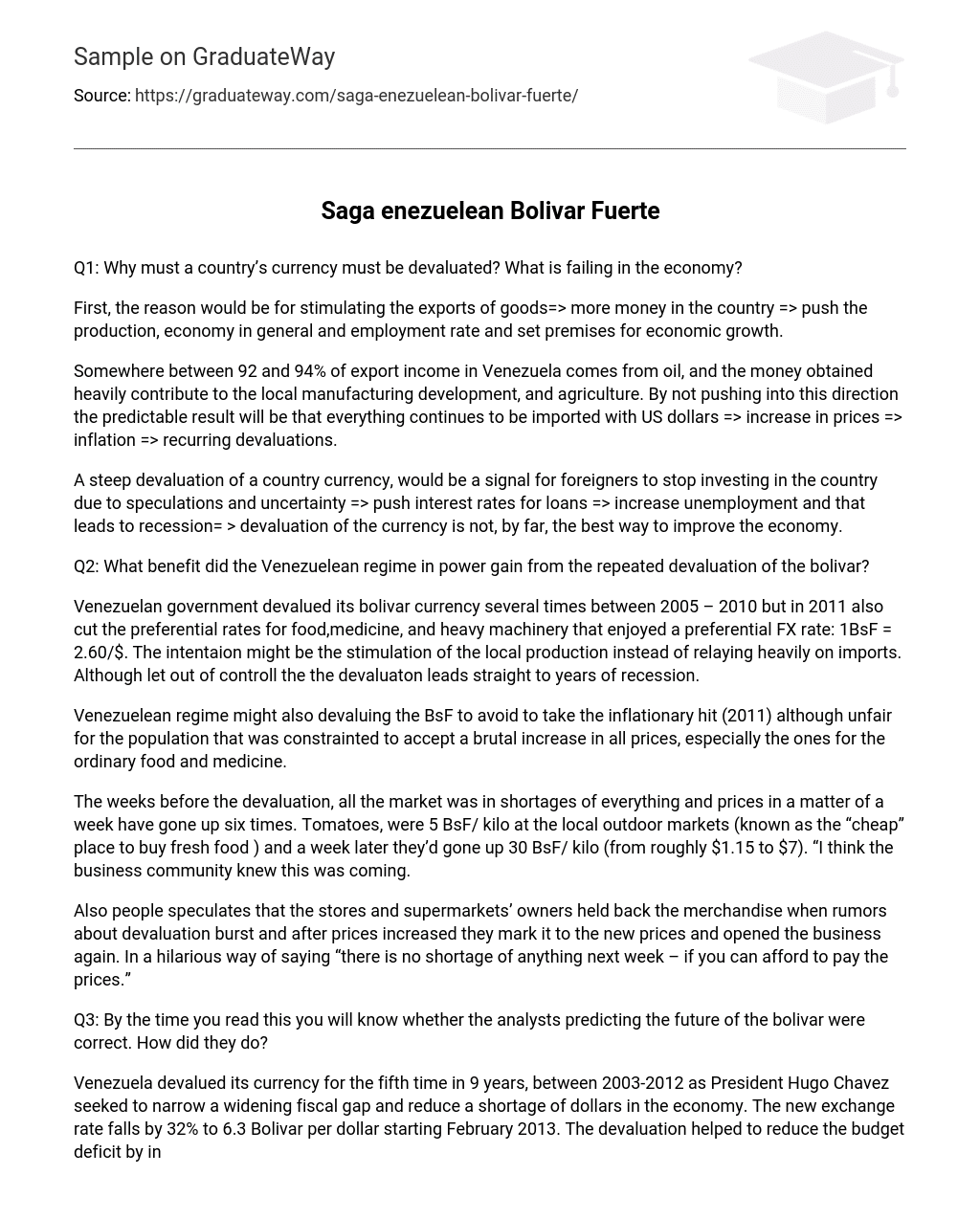Q1: Why must a country’s currency must be devaluated? What is failing in the economy?
First, the reason would be for stimulating the exports of goods=> more money in the country => push the production, economy in general and employment rate and set premises for economic growth.
Somewhere between 92 and 94% of export income in Venezuela comes from oil, and the money obtained heavily contribute to the local manufacturing development, and agriculture. By not pushing into this direction the predictable result will be that everything continues to be imported with US dollars => increase in prices => inflation => recurring devaluations.
A steep devaluation of a country currency, would be a signal for foreigners to stop investing in the country due to speculations and uncertainty => push interest rates for loans => increase unemployment and that leads to recession= > devaluation of the currency is not, by far, the best way to improve the economy.
Q2: What benefit did the Venezuelean regime in power gain from the repeated devaluation of the bolivar?
Venezuelan government devalued its bolivar currency several times between 2005 – 2010 but in 2011 also cut the preferential rates for food,medicine, and heavy machinery that enjoyed a preferential FX rate: 1BsF = 2.60/$. The intentaion might be the stimulation of the local production instead of relaying heavily on imports. Although let out of controll the the devaluaton leads straight to years of recession.
Venezuelean regime might also devaluing the BsF to avoid to take the inflationary hit (2011) although unfair for the population that was constrainted to accept a brutal increase in all prices, especially the ones for the ordinary food and medicine.
The weeks before the devaluation, all the market was in shortages of everything and prices in a matter of a week have gone up six times. Tomatoes, were 5 BsF/ kilo at the local outdoor markets (known as the “cheap” place to buy fresh food ) and a week later they’d gone up 30 BsF/ kilo (from roughly $1.15 to $7). “I think the business community knew this was coming.
Also people speculates that the stores and supermarkets’ owners held back the merchandise when rumors about devaluation burst and after prices increased they mark it to the new prices and opened the business again. In a hilarious way of saying “there is no shortage of anything next week – if you can afford to pay the prices.”
Q3: By the time you read this you will know whether the analysts predicting the future of the bolivar were correct. How did they do?
Venezuela devalued its currency for the fifth time in 9 years, between 2003-2012 as President Hugo Chavez seeked to narrow a widening fiscal gap and reduce a shortage of dollars in the economy. The new exchange rate falls by 32% to 6.3 Bolivar per dollar starting February 2013. The devaluation helped to reduce the budget deficit by increasing the amount of Bolivar the government receives from exports, especially oil. Venezuela’s fiscal gap widened to 11% of GDP in 2012 from 4% in 2011, according to Moody’s.
Annual inflation accelerated to 22.2% in January, the fastest pace in eight months, led by a jump in food prices. Prices decreased by 3.3% in January after rising 3.5% in December 2012. In the black market, the Bolivar weakened 6% to 19.53 BsF per $, according to Lechuga Verde, a website that tracks the rates.
The devaluation of the Bolivar created frustration and anger not only among the population and the politicians “against Chavez”, so called “Opposition” but even financial analysts and newspapers “pro Chavez” agreed that “devaluation of the Bolívar is a “betrayal of the Bolivarian Revolution” . Some opines that the “betrayal” consists in the government not having “consulted with the people” on the matter beforehand, especially after the people came out to support Chavez and the Bolivarian Process in October 2012 elections.
Chavez was not elected President in 2013 but Nicolas Maduro former Minister of Foregin Affairs and Vice President won the elections. (Apr 2013) However population is not over yet the outrage of the devaluation and vote of punishment for the new president is not out of the question, said the analysts.
Source: Internet, website articles” – “Lechuga Verde” /News





